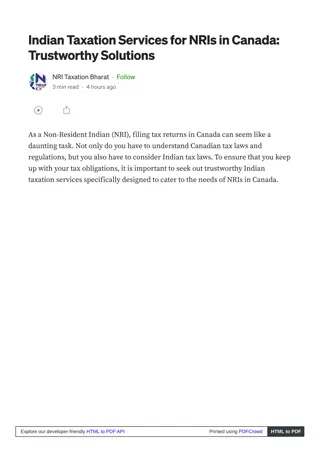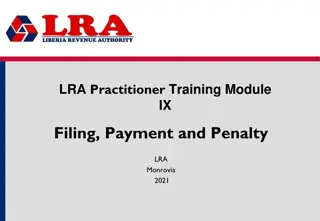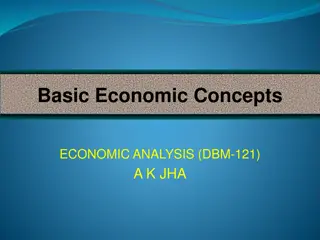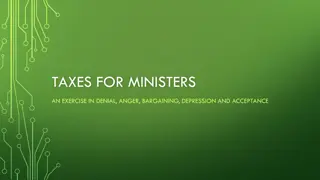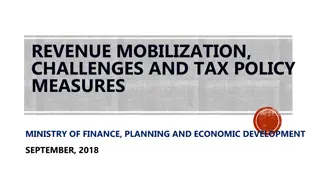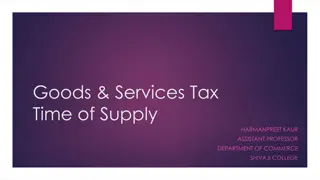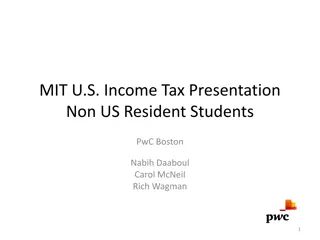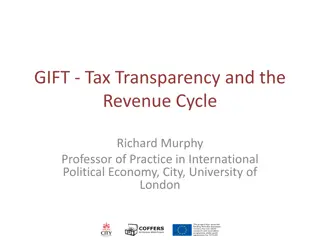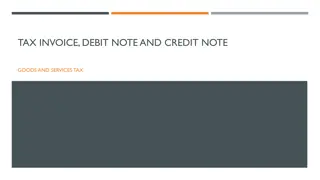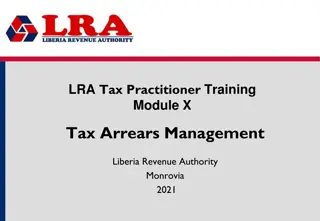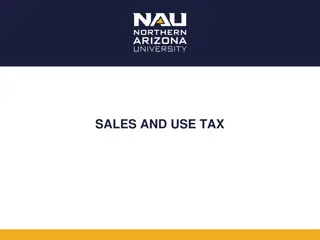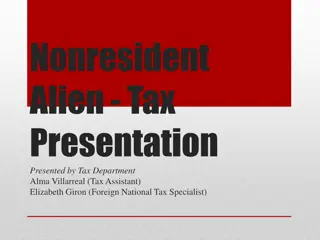GOODS AND SERVICES TAX
The Goods and Services Tax (GST) implementation in India has brought significant benefits, including the replacement of multiple taxes, reduction in tax burden on goods and services, and enhanced competitiveness in domestic and international markets. The transformational tax reform aims to streamline the indirect tax structure, leading to economic growth, job creation, and a more efficient tax system. Learn about the impact of GST on pricing, registration requirements, and more in this comprehensive overview.
Download Presentation

Please find below an Image/Link to download the presentation.
The content on the website is provided AS IS for your information and personal use only. It may not be sold, licensed, or shared on other websites without obtaining consent from the author.If you encounter any issues during the download, it is possible that the publisher has removed the file from their server.
You are allowed to download the files provided on this website for personal or commercial use, subject to the condition that they are used lawfully. All files are the property of their respective owners.
The content on the website is provided AS IS for your information and personal use only. It may not be sold, licensed, or shared on other websites without obtaining consent from the author.
E N D
Presentation Transcript
GOODS AND SERVICES TAX -An overview
INTRODUCTION: BENEFITS OF GST The benefits of this transformational tax reform are manifold. The benefits include: A single tax would replace multiple taxes. Set-off of prior-stage taxes would mitigate the ill effects of cascading. Tax benefiting common man.( currently estimated @ 25-30%). burden on goods and services would decrease, Implementation competitive in domestic and international markets. of GST would make our products It would boost economic activity and create more jobs. The GDP would grow though the estimates in this regard vary.
Existing Indirect Tax Structure in India StateTaxes Central Taxes Central Exciseduty Additional duties ofexcise Excise duty levied under Medicinal & Toilet Preparation Act Additional duties of customs (CVD &SAD) ServiceTax Surcharges &Cesses State VAT / Sales Tax Central SalesTax PurchaseTax Entertainment Tax (other than those levied by localbodies) LuxuryTax Entry Tax (All forms) Taxes on lottery, betting & gambling Surcharges &Cesses GST Constitution amended to provide concurrent powers to both Centre & States to levy GST (Centre to tax sale of goods and States to tax provision of services) 3
Reduction in Price of Goods under GST All other taxes are replaced by GST Cumulative taxes of 32% levied Rs.132 Rs.128 Service Tax 1% VAT 14.5% 32% 28% Entry Tax 2% Excise 12.5% GST@ 28% CST 2% Rs.100 Rs.100 Cost of production of goods is Rs. 100 Overall incidenceof tax will be reduced 4 21
REGISTRATION Liability to be registered A person who supplies goods and/or services with a turnover in excess of Rs. 20 Lakhs. A person who supplies goods and/or services with a turnover in excess of Rs. 10 Lakhs in the States of Arunachal Pradesh, Assam, Jammu and Kashmir, Manipur, Meghalaya, Mizoram, Nagaland, Sikkim, Tripura, Himachal Pradesh and Uttarakhand.
REGISTRATION Liability to be registered irrespective of threshold Persons making inter-State taxable supply Persons required to pay tax under reverse charge Casual and non-resident taxable persons E-Commerce operator Persons who supply goods through e-commerce operator An aggregator who supplies services under his brand name Persons who supply goods and/or services on behalf of a registered taxable person. Input Service Distributor Persons required to deduct tax at source
REGISTRATION.. Contd. A person, though not liable to be registered, may take registration voluntarily . Registration to be granted State-wise. A person having multiple business verticals in a State may obtain separate registration UN agencies, Multilateral Organizations, Embassies etc. shall be granted a Unique Identity Number instead of registration Registration shall be approved by either Central or State authorities. Registration shall be deemed to have been granted if no deficiency is communicated to the applicant within the prescribed period Cancellation of registration under CGST Act means a cancellation of registration under SGST Act and vice-versa.
Registration Number The taxpayer will be allotted a State wise PAN based 15 digit Goods and/or Services Taxpayer Identification Number (GSTIN) The digits in the GSTIN will denote the following State Code Entity code Check Digit PAN Blank 1 2 3 4 5 6 7 8 9 10 11 12 13 14 15 20
Composition Scheme Whose aggregate turnover in the preceding financial year did not exceed seventy five lakh rupees. Categories Tax Rate Traders 1% (CGST 0.5% + SGST 0.5%) Manufacturers 2% (CGST 1% + SGST 1%) Restaurants 5% (CGST 2.5%+SGST 2.5%) Conditions & restrictions He can not charge the GST on invoice i.e. tax can t be mentioned on the invoice and collected from the buyer. Can not avail any tax credit No inter-State outward supplies of goods; Not providing any supply of services Not engaged in supply of Non GST Goods
Tax Payment GST is to be deposited on or before filing of monthly GST Return and payment can be deposited by any of the following mode : i. Internet Banking, ii. NEFT/RTGS, iii. Debit Card or Credit Card iv. Cash, Cheque or Demand Draft up to Rs 10,000 only at authorised bank Every deposit made by a taxable person shall be credited to the electronic cash ledger of such person. Note: Return filed without Tax Payment is Invalid 30
Types of return under GST S. No. Return Nature Periodicity Remarks Data upload by supplier 1 GSTR 1 Details of outward supplies Monthly by 10th Auto-populated based on GST-1 of counter party 2 GSTR 2 Details of inward supplies Monthly by 15th Auto-populated based on GSTR-1 & 2 3 GSTR 3 Combined Monthly return Monthly by 20th Quarterly Return for compounding Taxable persons 18th of the month succeeding Quarter Data upload by supplier 4 GSTR 4 Last date 31st December of the succeeding FY 5 GSTR 9 Annual Return Last date 31st December of the succeeding FY Simplified Annual Return for Persons under composition scheme 6 GSTR 9A 31
Returns Relaxation for July & August Return Form Relaxed time lines GSTR-3B instead of GSTR-3 A simple Return Form3B containing total of supplies and input tax credit :- Month Relaxed Due Date 20th August 2017 July 2017 20th September 2017 August 2017 Month Relaxed Due Date GSTR-1 5th September 2017 July 2017 20th September 2017 August 2017 Month Relaxed Due Date GSTR-2 10th September 2017 July 2017 25th September 2017 August 2017
Contentsof Invoice Name, Address and GST Regn. No of the supplier Name, Address and GST Regn. No of the buyer, if registered, Serially numbered invoice & Date of Invoice Name and address of the buyer, along with the name of State, if such buyer is unregistered and taxable value of supply is fifty thousand rupees or more HSN code of goods or Accounting Code of services Description of goods or services & Quantity in case of goods Taxable value of goods or services, if any Rate of tax and amount of tax charged (CGST, SGST or IGST) Total Invoice value Each invoice to be signed or digitally signed by the authorized person 27
INVOICE MATCHING Sec. 42 & 43 After filing of return by the taxable person, his inward supplies and/or debit notes shall be matched with the corresponding outward supplies and/or debit notes declared by the supplier in his tax return. In case of matching, the ITC claimed by the taxable person shall be finally accepted and he shall be informed. In case of mis-match, the discrepancy shall be notified to the taxable person and his supplier. Where the supplier does not rectify the discrepancy in his return, the amount to the extent of discrepancy shall be added to the output tax liability of the taxable person.
INVOICE MATCHING.. Contd. Likewise, the reduction in tax liability due to issue of a credit note by the supplier shall be matched with the reduction in ITC claimed by the recipient in his return. In case of matching, such reduction in the tax liability shall be finally accepted and communicated to the supplier. In case of mis-match, the discrepancy shall be notified to the supplier and the recipient. Where the recipient does not rectify the discrepancy and reduce his ITC claim in his return, the amount to the extent of discrepancy shall be added to the output tax liability of the supplier. A taxable person can reclaim the ITC reversed only after the concerned supplier furnishes the details of invoice and/or debit note in his return.
Works Contract: Definition of Works Contract: Section 2 sub Section (110) defines - Works contract means a contract - Wherein transfer of property in goods is involved - In the execution of such contract - and includes contract for building, construction, fabrication, completion, erection, installation, fitting out, improvement, modification, repair, maintenance, renovation, alteration or commissioning of any immovable property;
What is not works contract: What is not works contract: 1. The contract that is merely for supply of goods is not a works contract. Like supply of material only for construction is pure supply of goods which attracts provision of supply of goods 2. The contract that is merely for supply of labour is also not works contract which attract provision of supply of service. Therefore Architect who only provides design for construction is not works contract.
Works contract Works Contract which Involvecivilconstruction WorksContractwhich Doesnotinvolvecivil construction Supply before Completion of construction Supply after Completionof construction Itissupply of service It is sale of Immovable property GST Leviable Itissupply ofservice NOGST GSTLeviable
TDS(TAX DEDUCT AT SOURCE) Section 51 of the CGST Act 2017 mandates the following to deduct tax at source: (a) a department or establishment of the Central Government or State Government; or (b) local authority; or (c) Governmental agencies; or (d) such persons or category of persons as may be notified by the Government on the recommendations of the Council,
TDS Cont The amount deducted as tax under this section shall be paid to the Government by the deductor within ten days after the end of the month in which such deduction is made, The deductor shall furnish to the deductee a certificate mentioning therein the contract value, rate of deduction, amount deducted, amount paid to the Government
TDS Cont If any deductor fails to furnish to the deductee the certificate, after deducting the tax at source, within five days of crediting the amount so deducted to the Government, the deductor shall pay, by way of a late fee, a sum of one hundred rupees per day from the day after the expiry of such five days period until the failure is rectified, subject to a maximum amount of five thousand rupees. The deductee shall claim credit, in his electronic cash ledger, of the tax deducted and reflected in the return of the deductor If any deductor fails to pay to the Government the amount deducted as tax under sub-section (1), he shall pay interest in accordance with the provisions of sub- section (1) of section 50, in addition to the amount of tax deducted.
TAX DEDUCTION AND COLLECTION ACCOUNT NUMBER (TDN) SECTION 25(6) of the CGST Act 2017 provides that a person required to deduct tax under section 51 may have, in lieu of a Permanent Account Number, a Tax Deduction and Collection Account Number issued under the said Act in order to be eligible for grant of registration
RRETURNS TO BE FILED ON TDS ETURNS TO BE FILED ON TDS Return Type Frequency Due Date Details to be Furnished 10th of succeeding month Furnish the details of TDS deducted Form GSTR-7 Monthly TDS Certificate capture details of value on which TDS is deducted and deposit on TDS deducted into appropriate Govt. TDS certificate to be made available for download Form GSTR-7A Monthly
TCS Collection of Tax at Source by the specified persons Section 52 of the CGST Act 2017 mandates every electronic commerce operator such as Flipkart, Amazon.. to collect tax at source in respect of supplies made through them shall collect an amount calculated at such rate not exceeding one per cent., as TCS on the net value of taxable supplies made through it by other suppliers where the consideration with respect to such supplies is to be collected by the operator. The amount collected shall be paid to the Government by the operator within ten days after the end of the month in which such collection is made
TCS Cont Every operator who collects the amount by way of TCS shall furnish a statement, electronically, containing the details of outward supplies of goods or services or both effected through it, including the supplies of goods or services or both returned through it, and the amount collected during a month, Every operator who collects the amount by way of TCS shall furnish an annual statement, electronically, containing the details of outward supplies of goods or services or both effected through it, including the supplies of goods or services or both returned through it, and the amount collected under the said sub-section during the financial year,
TCS Cont The supplier who has supplied the goods or services or both through the operator shall claim credit, in his electronic cash ledger, of the amount collected and reflected in the statement of the operator furnished The details of supplies furnished by every operator under sub-section (4) shall be matched with the corresponding details of outward supplies furnished by the concerned supplier registered under this Act Where the details of outward supplies furnished by the operator under sub-section (4) do not match with the corresponding details furnished by the supplier under section 37, the discrepancy shall be communicated to both persons in such manner and within such time as may be prescribed
TCS cont The amount in respect of which any discrepancy is communicated under sub-section (9) and which is not rectified by the supplier in his valid return or the operator in his statement for the month in which discrepancy is communicated, shall be added to the output tax liability of the said supplier The concerned supplier, in whose output tax liability any amount has been added under sub-section (10), shall pay the tax payable in respect of such supply along with interest, at the rate specified under sub- section (1) of section 50 on the amount so added from the date such tax was due till the date of its payment.
TCS ON CALL TAXI OPERATORS SUCH AS OLA / UBER/FAST TRACK Radio taxi or Passenger Transport Services provided through electronic commerce operator provider of service is Taxi driver or Rent a cab operator Recipient of Service is " any person" Liability on GST shall lie Electronic Commerce Operator under reverse charge mechanism
NS TO BE FILED ON TCS Frequency Due Date Return Type Details to be furnished Details of supplies effected through e-commerce operator and the amount of tax collected on supplies 10th of succeeding month Form GSTR-8 Monthly Annual statement containing the details of outward supplies of goods or services or both effected through an e-commerce operator, including the supplies of goods or services or both returned and the amount collected under Form GSTR-9B Annually 31th Dec of next fiscal
DIFFERENCE BETWEEN TDS AND TCS TDS is Tax Deducted at Source i.e. deducted by PAYER or BUYER . e.g. Contractee of a works contractor making payment for works executed would deduct TDS and pay to the department. TCS is Tax Collected at Source i.e. collected by PAYEE or SELLER or E-Commerce Operator on the sales / services made to them or through them and pay to the department Both, TDS and TCS are NOT taxes but are deducted from payment (TDS) or received more (TCS) and paid to the department on behalf of the supplier.
REFUNDS Sec.54 , 55 Refund can be claimed within 2 years from the relevant date. Refund of ITC allowed in case of exports or where the credit accumulation is on account of inverted duty structure. Refund shall be granted within 90 days from the date of receipt of application. In case of refund claim on account of exports, 90% of the claim can be given immediately on a provisional basis. Applicant shall produce documentary evidence that he has not passed on the incidence of tax on to any other person. No need to furnish such evidence if the refund claim is less than Rs. 5 lakhs. Self-certification would suffice. Interest payable after 3 months from the date of receipt of application till the date of refund. Refund of ITC not allowed where the export goods are subject to duty.
Activities to be done as a Vendor Enroll for Registration online at GSTIN Obtain the GSTIN of the suppliers and customers Issue the applicable tax invoice with all required details. Invoice to be issued for sale of other items such as lubricants, gas stove, suraksha pipes, inspection charges, convenio store at RO, car washing charges, ATM, sale of tyres etc Prepare excel sheet with details of output tax liability on supply of goods & services and tax credit available on purchases. Tax payment will be = Output tax liability-Tax Credit on Purchases Return filing is simple. In case of any problem, contact the return facilitator in the city. Ensure return filing and net payment within prescribed due date. In case of non filing of return, tax credit on purchases will not be available.
Activities to be done as a Customer Intimate your GST Registration number to all suppliers / vendors / customers On receipt of invoice, please check all details are correctly mentioned on invoice. In case of any discrepancy, intimate your supplier and get it corrected. Compile all your purchases to ascertain total tax credit to be adjusted against output tax liability Ensure that all purchases with correct details as uploaded by your supplier are appearing in your GSTR-2 In case of mismatch in supply data, you need to take up with supplier for correcting the details uploaded by him
Transitional Credits - Things to do Avail pending credit and carry forward closing balance Closing balance of CENVAT credit/ input tax credit as reflected in the last tax return should carry forward by filing Form GST TRAN-1 within 90 days Eligible tax credit of invoices issued within one year should be availed s In case of unregistered suppliers under Central Excise, credit of excise duty paid on goods in stock as on 30th June be availed under GST if the excise invoices are not older than 12 months. In case, excise invoice is not available, then the tax credit @ 60%/40% of GST be availed if the GST rate on goods is 18% or more/lesser than 18% respectively.
Frequently Asked Questions 1. Whether GST Registration is required even if a person is having aggregate turnover lesser than threshold limit of Rs 20 Lakhs/ Rs 10 Lakhs? Ans. Yes, it is mandatory to obtain GST registration in following cases even if the turnover is lesser than the threshold limit Persons making any Inter-State taxable supply of Goods / Services Persons who are required to pay tax under Reverse Charge Mechanism (RCM) Casual taxable persons or Non-resident taxable persons 2. A person is having turnover of GST goods/services of Rs 2 Lakhs & Non GST goods of Rs 19 Lakhs. Whether is he required to obtain GST registration ? Ans. Yes, he will be required to obtain GST registration as, AggregateTurnover for the purpose of GST registration means total turnover of a person having the same PAN in respect of the following: All taxable supplies under GST including interstate supplies Exempt supplies including Non GST supply Exports of goods and/or service 3. Whether a transporter registered as GTA is required to obtain GST registration ? Ans. No, transporter registered as GTA will not be required to obtain GST registration since the liability to pay tax on transportation is upon the recipient is under reverse Charge. However, if he has another line of business which is not under reverse charge, then he will be required to obtain GST registration
Frequently Asked Questions 4. A person is operating from multiple States, whether such a person can take single registration for business operations in multiple States or is required to take registration for each State separately? Ans. Under GST regime, there is no option for getting single registration for business operations in multiple States, hence, every person will be required to get separate GST Registration for each of the States where he has a business operation and is liable to pay GST 5. Whether present registration number under existing tax laws (Excise/Service Tax/VAT) will continue under GST or a fresh registration under GST is required? Ans. Registration number under present tax laws (Excise, Service Tax, VAT, CST etc) cannot be used under GST and every person would be required to obtain a fresh GST registration number and the same will be required to be mentioned on all Tax invoices for supply of Goods / Supplies. s 6. Can an unregistered vendor charge GST on invoice? Ans. No. A vendor without valid GST registration cannot charge GST on invoice and collect from the buyers. 7. What is exactly the concept of composition scheme under GST? Ans. A registered taxable person having aggregate turnover in preceding financial year less than or equal to Rs 75 lakhs will have option to pay taxes at reduced rates without availing benefit of Input tax credit. A tax payer opting for composition levy shall not collect any tax from his customers. The tax liability needs to be borne by him and deposited to Government from his pocket.
Frequently Asked Questions 8. Which are the cases in which a person can not opt for composition scheme? Ans. In following cases, a person can not opt for composition scheme if- Engaged in the supply of services Makes any supply of Non GST Goods Makes any inter-state supplies of goods 9. Can a person opt for composition scheme for one state and continue with normal scheme of GST for other states? Ans. A person has to opt for composition scheme for all business across all states. Option for availing composition scheme for one business /one state & normal scheme for other vertical/other states is not available. 10. Whether input tax credit of goods purchased from a person registered under composition scheme is available? Ans. No, Input tax credit of goods purchased from a person registered under composition scheme is not available.
Frequently Asked Questions 11. What is monthly return? Ans. Monthly return is auto populated from outwards & inwards return. Monthly return is the combination of Outward & Inward Return where all the information is to be consolidated and tax liability to be paid is finalised & paid through electronic cash ledger & credit ledger 12. Who is required to file monthly return? Ans. Every registered taxable person who is required to file outward & inward supplies return shall be liable to furnish the monthly return. 13. Is it mandatory to file outward, inward & monthly return even if no transaction is made in a month? Ans. Yes. Even if no transaction is made in a month also then we have to file NIL Returns. 14. Is the scanned copy of invoices to be uploaded along with GSTR-1? Ans. No scanned copy of invoices is to be uploaded. Only certain prescribed fields of information from invoices need to be uploaded
Frequently Asked Questions 15. Whether all invoices will have to be uploaded? Ans. No. It depends on whether B2B or B2C plus whether Intra-state or Inter-state supplies. For B2B supplies, all invoices, whether Intra-state or Inter- state supplies, will have to be uploaded. In B2C supplies, uploading in general may not be required as the buyer will not be taking ITC. However still in order to implement the destination based principle, invoices of value more than Rs.2.5 lacs in inter-state B2C supplies will have to be uploaded. For inter-state invoices below Rs. 2.5 lacs and all intra-state invoices, state wise summary will be sufficient. 16. Can a recipient feed information in his GSTR-2 which has been missed by the supplier? Ans. Yes, the recipient can himself feed the invoices not uploaded by his supplier. The credit on such invoices will also be given provisionally but will be subject to matching. 17. Do tax payers under the composition scheme also need to file GSTR-1 and GSTR-2? Ans. No. Composition tax payers do not need to file any statement of outward or inward supplies. They have to file a quarterly return in Form GSTR-4 by the 18th of the month after the end of the quarter. 18. Is it compulsory for a taxpayer to file return by himself? Ans. No. A registered taxpayer can also get his return filed through a Tax Return Preparer, duly approved by the Central or the State tax administration.
Frequently Asked Questions 19. What is the consequence of not filing the return within the prescribed date ? Ans. A registered person who files return beyond the prescribed date will have to pay late fees of rupees one hundred for every day of delay subject to a maximum of rupees five thousand . 20. Can a registered tax payer opting to pay tax under composite scheme under GST be eligible for Input Tax Credit? Ans. No. The amount of input tax credit carried forward in the last return under the existing law preceding the appointed date shall lapse and will not be allowed as credit in the electronic credit ledger under GST 21. Will Central Sales Tax (CST) paid under the earlier law be available as credit under GST? Ans. No, the transitional provisions do not permit credit of Central Sales Tax paid, even though such component may be present in inputs in stock or inputs contained in Semi- finished goods or finished goods. 22. Can stock held for more than one year be eligible to claim GST credit (i.e. in case of FSD/SSD or Registered importer, etc.)? Ans. No. The provision contains a condition that only stock in respect of which the duty paying document is issued within one year from the appointed date is eligible for credit under GST.
Frequently Asked Questions 23. When is tax invoice required to be prepared for Service? Ans. Registered Person shall be required to issue tax invoice before or after the provision of service but within a period of 30 days from the date of supply of service. 24. In what manner tax invoice is to be issued for supply of Goods? Ans. Tax invoice for supply of goods is required in Triplicate: i. Original for Recipient ii. Duplicate for Transporter iii. Triplicate for Supplier 25. In what manner tax invoice is to be issued for supply of Services? Ans. Tax invoice for supply of services is required in Duplicate : i. Original for Recipient ii. Duplicate for Supplier
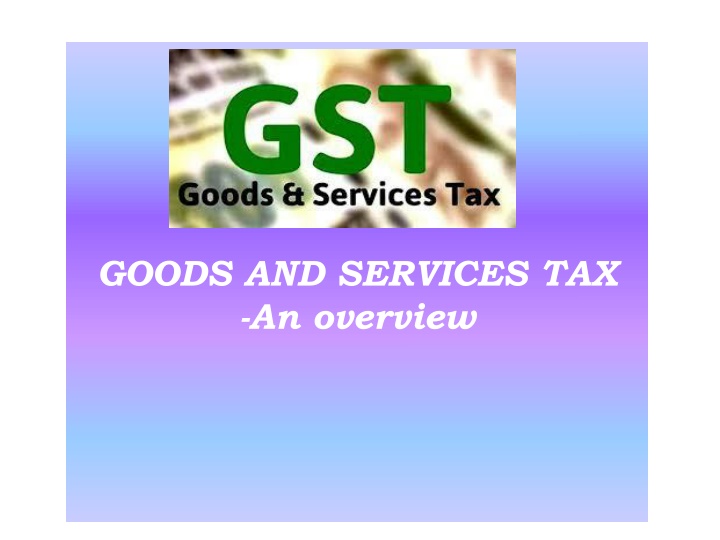


![Town of [Town Name] Real Estate Tax Rates and FY 2024 Budget Summary](/thumb/62211/town-of-town-name-real-estate-tax-rates-and-fy-2024-budget-summary.jpg)

